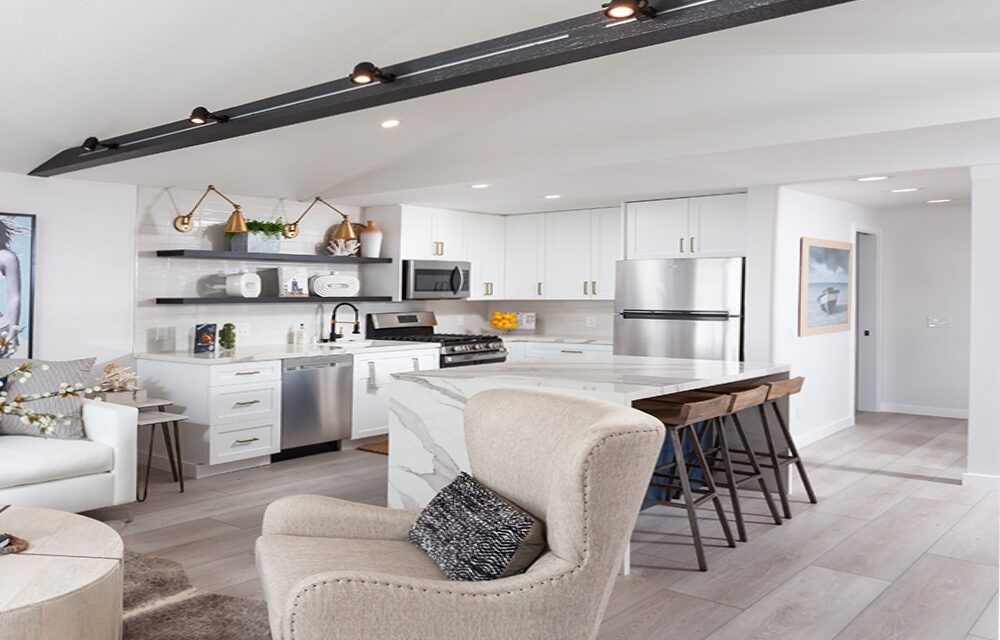The main photo is courtesy of Revive, which showcases a beach bungalow that they renovated into a turnkey property.
Increasing numbers of homebuyers are seeking turnkey homes that are in move-in-ready condition. Here’s why and what you need to know about turnkey properties, whether you are looking to buy one, or hoping to list your property as a highly coveted “turnkey home”.
Table of Contents
- What is a Turnkey Home?
- How do You Know If a Home is Turnkey?
- Traits & Features of a Turnkey Home
- An Example of a Turnkey Home
- Why are Turnkey Homes in High Demand?
- Benefits of Buying a Turnkey Home
- Disadvantages of Buying a Turnkey Home
- Tips When Making Your Home Turnkey Ready for Sale
- Tips When Considering Buying a Turnkey Home
- Before & After Photo Galleries of Turnkey Properties
- Recommended Reading
Also see:
What is a Turnkey Home?
A turnkey home is a house that is for sale or available to rent that does not require any significant renovations or upgrades for a given buyer or renter. This implies that all systems of the house are in good shape and that all of the amenities and design elements are to current standards.
The phrase “turnkey home” is derived from the expectation that a buyer or future occupant can literally:
- “turn your key in the lock of a home and move right in”
In short, turnkey properties are considered to be ready for immediate occupancy. In the property management industry, a turnkey house implies that a property can be rented immediately, without needing any additional work or repairs. This is a highly attractive trait for a rental property, as this means the investor owner can start earning revenue without any delays.
A turnkey home is also described as being “move-in ready”, as in the home is ready to be occupied and the buyers just need to move in their belongings, furnishings and décor items.
How do You Know If a Home is Turnkey?
Though turnkey implies that a property is move-in ready, what that actually means in terms of features, amenities and design, is dependent on the local market and competitive options.
Turnkey is a Subjective Term
It is important to keep in mind that the term “turnkey” is subjective, as it refers to a collection of living features upon which no two people may agree. Therefore, whether buying or preparing a home to sell, it is critical to research the details of comparable properties that are listed or have recently sold in your immediate market.
When selling your home, “turnkey” will mean what a prospective buyer thinks it should be. In other words, your home needs to meet ALL of the key expectations of the buyer – again your home does not require any significant upgrades, repairs or renovations.
Conversely, when buying your home, “turnkey” will mean what the seller thinks it should be. Therefore, as a buyer, you will need to have a list of your expectations and confirm how the features and condition of a given home stack up to your needs. If all of your conditions are not met, then requests can be made to bring the property to your necessary standard.
The two diametric interpretations of “turnkey” can be summarized as:
- Good Definition: Everything in the house is new, upgraded, or in excellent condition with no visible signs of wear. The home has all standard features to be expected in a contemporary home for a given market.
- Poor Definition: The house is clean, newly painted, with most items in good condition. However the house may lack several key features and amenities of a contemporary home.
Traits & Features of Turnkey Home
Even though the definition of turnkey can be loosely interpreted, here are the most common features of homes listed as “turnkey”:
- New Energy Efficient Appliances
- New Countertops on Trend with Local Market Tastes
- New or Refurbished Cabinets
- New or Refurbished Flooring
- New Paint that is Neutral
- All Major Systems in Excellent Operating Condition:
- HVAC, Plumbing, Electrical, Roofing
An Example of a Turnkey Home
Property: 711 Clayton Ave, El Cerrito, CA, MLS Listing Page
Listing Agent: Sarah Ridge, District Homes Realty
Pre-Sale Renovations Partner: Revive
Pre-Sale Renovations Case Study: 711 Clayton Ave
As-Is List Price: $830,000
Sold Price: $1,425,000
Date Sold: 3/3/2022
Walk-Through Video Tour
3D Virtual Tour
Why are Turnkey Homes in High Demand?
Turnkey homes are often the end result of “flipped homes”, where a real estate investor or developer buys a home that needs significant work to bring it to competitive standards of its immediate market.
Many reality shows have chronicled this business practice making it a popular cultural topic called “House Flipping”. The popularity of these shows, led by HGTV and supported by social media, has made a lasting impact on many younger homebuyers, as they expect high-quality properties, with no issues in their purchases.
Why are Turnkey Homes Popular with Millennials?
Home buying Millennials have become known as the HGTV generation, who are looking for Instagrammable homes. They want move-in ready residences that are well-designed with contemporary amenities that are easy to maintain.
Besides having a good understanding of what they want in terms of aesthetics and features, they are also a busy generation that is unwilling and unable to sign up for lengthy, complex renovation projects after purchasing a home. Families with young children also looking for safe, reliable, move-in-ready homes that do not require inconvenient or perilous renovation projects.
Benefits of Buying a Turnkey Home
- Convenience: Turnkey homes are move-in ready for new residents, which saves time and money, and eliminates the hassle of living through renovations.
- Assurance: Turnkey homes give home buyers confidence that all critical systems are in excellent operating condition, which will dramatically reduce the chances of encountering unexpected breakdowns and costly repairs.
- Safety: Turnkey homes are a safer option for homebuyers that are moving to a new location, where they may not have any industry or trade contacts, referrals or familiarity with local building codes
- Quick Cash Flow for Real Estate Investors: The concept of turnkey properties grew in popularity within real estate investment circles, as the term refers to residences and commercial buildings that are ready for immediate occupancy. This means investors can immediately start earning revenue to begin covering their initial capital outlay.
Disadvantages of Buying a Turnkey Home
- Costly: Turnkey homes can command a premium price that is well in excess of the underlying total costs of the underlying upgrades and enhancements.
- Poor Quality: Many turnkey homes may be the result of recent, rushed flips that cut corners in terms of methods, materials and craftsmanship.
- Too Cash Poor for Immediate Upgrades: Regardless of the quality of upgrades and enhanced features, buyers of turnkey homes may have insufficient cash reserves to cover design and décor enhancements like furniture, décor, floor coverings, window treatments and outdoor furniture.
- Reduced Personalization: Buyers of turnkey homes will have less control over a home’s aesthetic style, layout and overall appearance.
Tips When Making Your Home Turnkey Ready for Sale
If you need to sell your home on a tight schedule, we cannot overstate the high risks that attempting major renovations will present to the typical homeowner. There are innumerable variables that can derail or delay progress in a renovation project. Many of these obstacles may be out of the homeowner’s control, such as:
- Delays finalizing projects specs and choosing a proposal and general contractor
- Delays scheduling inspections
- Delays acquiring permits
- Availability of materials
- Availability of key contractors and workers
- Delays due to inclement weather
If the window of time to sell your home is tight or you need to maximize your profit, we strongly recommend reaching out to companies that specialize in Pre-Sale Renovations. Here are examples of pioneering pre-sale renovation firms that are growing their coverage across the US:
These firms have all created capabilities to help homeowner’s maximize their homes’ sale prices through strategic upgrades. The Pre-Sale Renovation process is not just about completing major renovations on time, with good quality materials and construction, but choosing the right upgrades for which prospective buyers will pay a premium price.
Unlike real estate programs that solely provide financing for pre-sale renovations, these firms have systems and contractor networks in place that will manage the entire process on behalf of the homeowner. They all understand the need to deliver the right upgrades, on schedule and on budget.
For owners looking to upgrade rental properties, we recommend looking into firms like Zeus Living and Belong, which help property owners to maximize their rental income by offering competitive upgrades and features.
Tips When Considering Buying a Turnkey Home
The most important advice to impart on home buyers is to do your homework on a prospective property, including a thorough inspection, to make sure that the home in question meets your expectations of “turnkey”.
Many homes that are listed as turnkey have been recently renovated or flipped. Not all renovations and underlying contractors are equal however, so it is critical to inspect the quality of the work performed, including materials, permits and finishes.
In recent years, there has been market pressure that has enabled house flippers to cut corners on their renovation efforts. A tight housing market has made it easier for imperfections of flipped houses to be overlooked, giving more incentive to house flippers to further reduce material costs, while speeding up their construction processes.
In the most egregious cases, this is referred to as “putting lipstick on a pig”, which implies haphazardly applying inexpensive aesthetic patches, while ignoring more substantive upgrades, like upgrading the underlying systems.
In general, we would place more value on a home whose systems (HVAC, Plumbing, Electrical, Roofing and Foundation) are in excellent condition, especially for older homes. Conversely, a well-designed and aesthetically upgraded home, may need to be “ripped open” if, in a few years’ time, the underlying systems need to be repaired or updated (e.g. water pipes, sewer lines, etc.).
Another important tip is to identify the most important features you need in your new home, including the neighborhood. All things being equal, yes, a turnkey, move-in ready home would be preferred over a home that needs major repairs – IF the asking price does not reflect an unreasonable premium for the “turnkey” upgrades.
Thus, a fixer-upper home located in a preferred neighborhood on an ideal lot, would more often be the smarter long-term investment, than purchasing a turnkey, move-in ready property, in a less desirable neighborhood on a poor lot.
Before & After Photo Galleries of Turnkey Properties
- Curbio Pre-Sale Renovation Projects
- Renovation Sells Before & After Renovation Gallery
- Revive Pre-Sale Renovation Case Studies
- Zeus Living Rental Property Gallery on Instagram
Recommended Reading
- Proptech that Enables Homebuyers to Make All Cash Offers
- Cost-Effective Alternatives for Prepping Your Home for Sale
- How to Make Homebuyers Want Your Home in the First 8 Seconds
- Home Inspection Technologies to Alleviate Your Purchase Anxiety
- Researching a Neighborhood: Frequently Asked Questions
- How Technology is Influencing What Consumers Want from Homeownership
- Does an ADU Add Value to Your Home? Surprising Trends from HomeLight
| Purgula is reader-supported. When you click on links to other sites from our website, we may earn affiliate commissions, at no cost to you. If you find our content to be helpful, this is an easy way for you to support our mission. Thanks! Learn more. |







